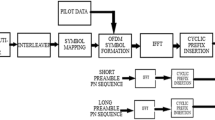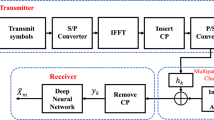Abstract
OFDM (ORTHOGONAL frequency-division multiplexing) is a well-known modulation scheme that has been widely employed in wireless broadband systems in the previous decade to combat frequency-selective type fading in wireless channels. In OFDM approaches, channel state information is critical for detecting and decoding coherent signals. Pilot tones are frequently included into the subcarriers of OFDM signals to perform channel estimation. The perceptron neural network (DNN) has shown to be an effective tool for channel estimation in wireless communication's suboptimal conditions. Prior to the demodulation of OFDM signals, a dynamic channel estimate is important. Depending on the channel types and circumstances, deep learning-based channel estimation outperforms classical channel estimation methods such as minimal mean-square error (MMSE) and least squares (LS). The simulation results validate the projected Perceptron model’s validity and demonstrate the use of our proposed Perceptron-based channel estimation in both nonlinear and linear signal models.




Similar content being viewed by others
References
Van Chien, T., & Björnson, E. Massive MIMO communications. In: 5G Mobile communications (pp. 77–116). Springer, cham. (2017). https://doi.org/10.3390/s20102753
H. Ye, G.Y. Li, B.H. Juang, Power of deep learning for channel estimation and signal detection in OFDM systems. IEEE Wire Commun Lett 7(1), 114–117 (2017). https://doi.org/10.1109/LWC.2017.2757490
Q. Hu, F. Gao, H. Zhang, S. Jin, G.Y. Li, Deep learning for channel estimation: Interpretation, performance, and comparison. IEEE Trans. Wire. Commun. 20(4), 2398–2412 (2020). https://doi.org/10.1109/TWC.2020.3042074
X. Yi, C. Zhong, Deep learning for joint channel estimation and signal detection in OFDM systems. IEEE Commun. Lett. 24(12), 2780–2784 (2020). https://doi.org/10.1109/LCOMM.2020.3014382
T. Van Chien, T.N. Canh, E. Björnson, E.G. Larsson, Power control in cellular massive MIMO with varying user activity: A deep learning solution. IEEE Trans. Wireless Commun. 19(9), 5732–5748 (2020). https://doi.org/10.1109/TWC.2020.2996368
C.J. Chun, J.M. Kang, I.M. Kim, Deep learning-based channel estimation for massive MIMO systems. IEEE Wireless Commun. Lett. 8(4), 1228–1231 (2019). https://doi.org/10.1109/LWC.2019.2912378
Le Ha, A., Van Chien, T., Nguyen, T. H., & Choi, W. Deep learning-aided 5G channel estimation. In 2021 15th international conference on ubiquitous information management and communication (IMCOM) (2021, Jan). (pp. 1–7). IEEE https://doi.org/10.1109/IMCOM51814.2021.9377351.
Y. Yang, F. Gao, X. Ma, S. Zhang, Deep learning-based channel estimation for doubly selective fading channels. IEEE Access 7, 36579–36589 (2019). https://doi.org/10.1109/ACCESS.2019.2901066
T. O’shea, J. Hoydis, An introduction to deep learning for the physical layer. IEEE Trans. Cognitive Commun. Net. 3(4), 563–575 (2017). https://doi.org/10.1109/TCCN.2017.2758370
Y. Yang, F. Gao, G.Y. Li, M. Jian, Deep learning-based downlink channel prediction for FDD massive MIMO system. IEEE Commun. Lett. 23(11), 1994–1998 (2019). https://doi.org/10.1109/TCOMM.2020.3019077
D. Neumann, T. Wiese, W. Utschick, Learning the MMSE channel estimator. IEEE Trans. Signal Process. 66(11), 2905–2917 (2018). https://doi.org/10.1109/TSP.2018.2799164
Q. Yuan, D. Li, Z. Wang, C. Liu, C. He, Channel estimation and pilot design for uplink sparse code multiple access system based on complex-valued sparse autoencoder. IEEE Access. (2019). https://doi.org/10.1109/ACCESS.2019.2904990
K. Koufos, K. Haloui, M. Dianati, M. Higgins, J. Elmirghani, M. Imran, R. Tafazolli, Trends in intelligent communication systems: review of standards, major research projects, and identification of research gaps. J. Sens. Actuator Netw. 10(4), 60 (2021). https://doi.org/10.3390/jsan10040060
Mei, K., Liu, J., Zhang, X., & Wei, J. Machine learning based channel estimation: A computational approach for universal channel conditions. (2019). arXiv preprint arXiv:1911.03886https://doi.org/10.13140/RG.2.2.12584.11527.
H. Huang, J. Yang, H. Huang, Y. Song, G. Gui, Deep learning for super-resolution channel estimation and DOA estimation based massive MIMO system. IEEE Trans. Veh. Technol. 67(9), 8549–8560 (2018). https://doi.org/10.1109/TVT.2018.2851783
H. Ye, G.Y. Li, B.H. Juang, Power of deep learning for channel estimation and signal detection in OFDM systems. IEEE Wireless Commun. Lett. 7(1), 114–117 (2017). https://doi.org/10.1109/LWC.2017.2757490
H. Ye, L. Liang, G.Y. Li, B.H. Juang, Deep learning-based end-to-end wireless communication systems with conditional GANs as unknown channels. IEEE Trans. Wireless Commun. 19(5), 3133–3143 (2020). https://doi.org/10.1109/TWC.2020.2970707
S. Dörner, S. Cammerer, J. Hoydis, S. Ten Brink, Deep learning based communication over the air. IEEE J. Selected Topics Signal Process. 12(1), 132–143 (2017). https://doi.org/10.1109/JSTSP.2017.2784180
Ye, H., Li, G. Y., Juang, B. H. F., & Sivanesan, K. Channel agnostic end-to-end learning based communication systems with conditional GAN. In 2018 IEEE globecom workshops(2018, Dec). (GC Wkshps) (pp. 1–5). IEEE https://doi.org/10.1109/GLOCOMW.2018.8644250.
Author information
Authors and Affiliations
Corresponding author
Additional information
Publisher's Note
Springer Nature remains neutral with regard to jurisdictional claims in published maps and institutional affiliations.
Rights and permissions
Springer Nature or its licensor holds exclusive rights to this article under a publishing agreement with the author(s) or other rightsholder(s); author self-archiving of the accepted manuscript version of this article is solely governed by the terms of such publishing agreement and applicable law.
About this article
Cite this article
Rani, M., Singal, P. Perceptron for channel estimation and signal detection in OFDM systems. J Opt 52, 69–76 (2023). https://doi.org/10.1007/s12596-022-00924-x
Received:
Accepted:
Published:
Issue Date:
DOI: https://doi.org/10.1007/s12596-022-00924-x




